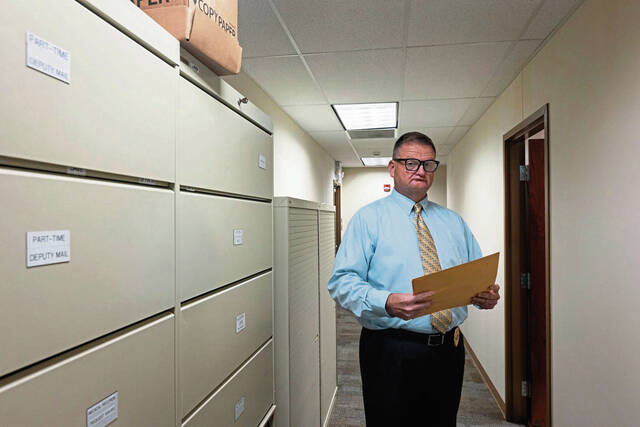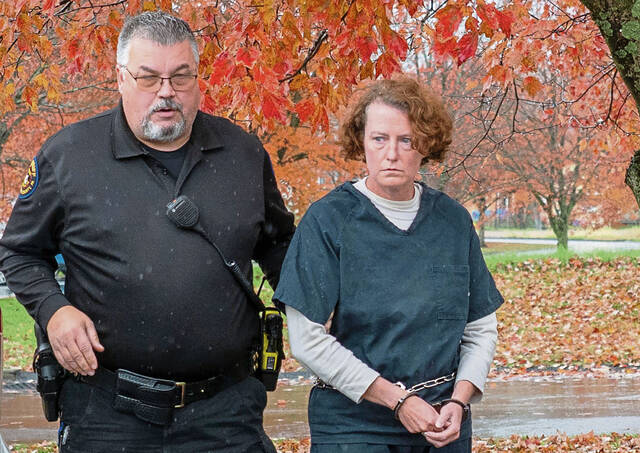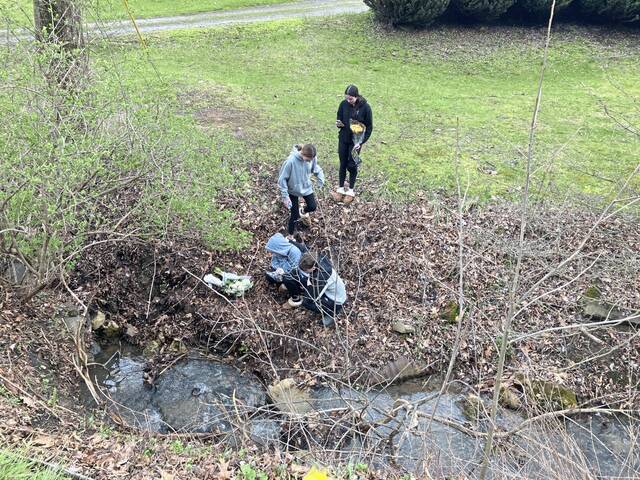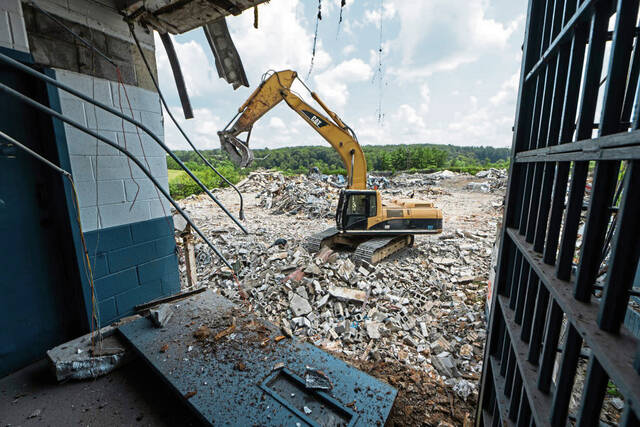From coast to coast, officials have tried to block Terence Keel from getting autopsy reports as he studies jail and police-custody deaths.
But after clashing with recalcitrant civil servants in California, Illinois, Maryland and Texas, the UCLA professor said no state has vexed him like Pennsylvania.
In his quest for access, Keel has dragged a half-dozen counties and coroners before Pennsylvania’s Office of Open Records for refusing to turn over autopsy reports, the lifeblood of his scholarly research. He lamented the lack of a centralized state database of coroners’ records. And he blanched at the fee that coroners can charge for autopsy reports.
At $500, it’s several times what Los Angeles demands.
“It’s the effort to deny access to a file that’s the most troubling in Pennsylvania,” said Keel, who has written extensively about jail deaths in Los Angeles and is investigating the phenomenon across the nation. “The more effort to deny the access, the higher the suspicion. Why not be transparent?”
Autopsy records contain intimate details about the dead — minutiae about their organs and tissues, signs of illness and evidence of trauma. Toxicology reports reveal any drugs or alcohol in the dead person’s system.
Such records are critical for scholars, the media, public policy researchers and others examining sweeping societal ills such as gun violence, in-custody deaths, covid-19, suicides, environmental hazards, opioid overdoses and child neglect.
State law makes autopsy and toxicology reports public, transparency advocates say.
But, across Pennsylvania, coroners and county attorneys have frequently pushed to shut off access to these crucial records, sparking legal slugfests in counties from Allegheny to York.
Unlike some states with a single medical examiner’s office, each of Pennsylvania’s 67 counties has someone different in charge of death investigations, meaning there is no consistent or uniform approach to dealing with coroners’ paperwork.
Add to that the defiant attitude of many coroners, who believe that part of their role is to safeguard the privacy of the dead and chafe at efforts to obtain autopsy records, and battles over access are inevitable.
“They just can’t come in and ask for someone’s record without a reason. … I’m not going to hand out someone’s toxicology or some of the stuff in an autopsy report,” Westmoreland County Coroner Timothy Carson said. “Someone just coming down that isn’t a relative or isn’t law enforcement? You can get a subpoena from a judge.”
Public or private?
Melissa Melewsky, media law counsel for the Pennsylvania NewsMedia Association, points to the state Coroner’s Act, which directs coroners in all but the state’s largest counties to file their official records from the prior year with a separate elected official — the prothonotary — by the end of January and make them available for public inspection.
These include the most basic death records, known to some as View of Body reports, which provide minimal information about coroners’ cases: name, age, race, gender, residence and place of death, as well as the cause and manner of death.
Bolstering public access, advocates say, are two key state Supreme Court decisions.
One, issued in 2009, resolved a case against the Lehigh County coroner that involved journalists trying to get autopsy records for a police officer shot dead inside a police station. The high court determined that autopsy reports are official records that must be filed with the local prothonotary, who maintains a range of civil documents for public inspection.
The other, a 2012 decision involving a TV station investigating a college student’s death, found that anyone who wants those records before the end of January doesn’t have to wait. As long as they’re willing to pay, they can seek immediate access.
The latter ruling noted that the release of records is not discretionary. These court decisions, however, have not swayed coroners and medical examiners.
In a FAQ section on its website, the York County coroner describes which records are available to the public — and which aren’t: “The Coroner’s Investigative Report, Autopsy and Toxicology Reports are not public records. These reports contain information that is protected by Federal and State Laws.”
Asked who can see autopsy and toxicology reports, Cambria County Coroner Jeffrey Lees said, “Nobody” before acknowledging that he provides them to next of kin and law enforcement — but not the general public.
“I do not release autopsy or toxicology reports,” Lees said. “They are not public records.”
Allegheny County, which runs the jail as well as the medical examiner’s office, does not release autopsy and toxicology reports to the public either. Amie Downs, an Allegheny County spokeswoman, said only the basic death information is released publicly. However, a court ruling last week could change that.
Those against disclosure cite numerous reasons to keep the information confidential: privacy rights, concerns about interference with criminal investigations and the need to abide by laws that protect personal medical information.
Susan Shanaman, the Pennsylvania State Coroners Association’s former lawyer, filed a friend-of-the-court brief supporting Allegheny County’s denial of autopsy records sought by Pittsburgh journalist Brittany Hailer, who is investigating deaths at the jail. The state Commonwealth Court ruled in Hailer’s favor last week, reversing a trial court’s ruling. It remains unclear whether the county will appeal.
“While these individuals are dead, they and their families are still subject to harm by the release of private medical information,” Shanaman wrote. “We are talking about people’s lives, reputations and constitutional protections over their and their family’s medical records.”
Scott Lynn, the coroner of tiny Montour County and president of the coroners association, questioned whether it is in the “best interests” of the public to see autopsy information. He wondered aloud why anyone would need autopsy records if they had access to the basic death report.
Lynn said the public could make an appointment to look at autopsy records in his office — as long as no one made a copy or photographed them. When asked how that stance squares with the state law that allows the public to buy a copy, he said, “I’d have to weigh what their interest in the case would be.”
As for the Supreme Court decisions, Lynn said, “I think things have changed, and there’s a different perspective.”
Coroners and their supporters have adopted a kitchen-sink approach when arguing against disclosure, claiming that any number of factors — various state and federal laws, the U.S. and Pennsylvania constitutions, even the use of punctuation in a 2018 amendment to the Coroner’s Act — should override the state’s high court and keep the records out of public hands.
Storage concerns
Despite the law, it’s rare that anything but basic death reports are filed with a prothonotary.
Even when coroners turn over autopsy reports, a prothonotary is liable to store them off-site and send requesters back to the coroner for approval to see them.
Greene County Prothonotary Susan White keeps a binder with a list of the prior year’s coroner’s cases that the public can look at. She also has autopsy reports and other records — but they’re under lock and key.
“I can’t physically give you a coroner’s record,” White said. “I provide the storage. But I don’t have any purview of what’s public and what’s not.”
White’s hands-off position is not unusual among prothonotaries, independent elected officials who serve as a county’s filing cabinet for civil records. They often take a passive stance in this feud and defer to coroners or judges to decide what’s public.
“We’re not in the job of chasing the coroner down to file stuff,” said Eric Feder, president of the Pennsylvania State Association of the Prothonotaries and Clerks of Courts.
That’s true, said Paula Knudsen Burke, a lawyer with the Reporters Committee for Freedom of the Press, which has fought for access to coroners’ records. But, she said, prothonotaries don’t have discretion over what to make public. If it’s in their possession, she said, it’s available.
Not so, claimed Jeffrey S. Shank, solicitor for the prothonotaries association, who said access decisions “are controlled by the coroners.”
Side agreements
Sometimes a prothonotary signs an agreement handing oversight and storage back to the coroner.
In Westmoreland County, Prothonotary Gina O’Barto said she doesn’t have the space for coroner’s reports — including the most basic ones. She and the coroner have signed a letter in which Carson asked permission to keep his records.
The county code allows for that arrangement, proponents argue.
Melewsky doesn’t buy it. She questions whether any legal authority exists that allows for such a pact.
Local public officials “cannot rewrite a state statute by creating a contract,” Melewsky said.
Another problem with the prothonotary ceding storage, Melewsky said: Coroners aren’t accustomed to providing public access in the same way as prothonotaries, who routinely deal with people seeking records.
Take Cambria County. No coroner’s reports of any kind are available for immediate access at the prothonotary’s office.
“The reports are generated from within my office, and it’s my opinion that’s where they should stay,” Lees said.
And while Lees, the coroner for eight years, acknowledged that basic reports are available to all, seeing them is not so simple because of limited staff and hours. He recommends that people make an appointment.
“I don’t want somebody making a trip to my office if we’re out on a call,” said Lees, speaking during a recent busy day from the scene of a small plane crash.
Then he made this claim:
“I have a letter from the prothonotary stating that I am a branch of their office and therefore my records can be kept in my office.”
Asked what legal authority permits him, as an independent elected official, to become a branch of a different independent elected official’s office, Lees didn’t have an explanation.
‘Tortured’ reasoning
The ongoing controversy over coroners’ records speaks to the problems posed by Pennsylvania’s patchwork approach to storage and access. Philadelphia is treated one way under the law, Allegheny and similarly sized counties are treated another way, and then there’s everyone else.
The dispute also underscores that until and unless they are challenged in court by someone with the resources to pursue a winning lawsuit, county-level officials are left to make their own rules and depend on their lawyers’ interpretations about where to keep death records and who can see them regardless of what case law dictates.
Jonah Walters, a Pennsylvania native, is a post-doctoral researcher for UCLA’s Keel and the point person for digging up death records in the commonwealth.
Last year, he contacted nearly all counties in the state asking for access to coroners’ records deposited with the prothonotary. Most told him that the only thing that coroners sent over were the basic reports — what Walters called “glorified death certificates.”
A follow-up request targeted 41 counties, where Walters said several thousand deaths occurred since 2000 in jails and prisons and while suspects were in police custody.
Most offices rejected the request for various reasons, Walters said. The only counties to turn over the records without a fight: Lancaster, which lost a court battle over coroners’ records in 2019, and Lebanon.
Ghoulish or crucial details?
Open-records supporters know that opponents sometimes attribute untoward motives to the media and others seeking details about people’s final moments.
Controversies have flared when it comes to seeking what some might consider gruesome images or descriptions of high-profile deaths. Think of the 2001 crash that killed NASCAR racer Dale Earnhardt during the Daytona 500. The Orlando Sentinel sought autopsy photos as it investigated race car safety, but its request generated emotional, high-profile battles.
“I think the opposition tends to portray this as a ghoulish pursuit when in fact it’s a longstanding tradition of examining the ways we die,” said Burke, the lawyer for the reporters committee.
Burke and her colleagues note that anyone with legal standing who wants to block release of coroners’ records can take the matter to a judge. The presumption, however, is that the records are public.
As someone who studies in-custody deaths, Keel believes that what coroners’ records can reveal — broken bones, bruises, damaged organs, illness, disease — are key to understanding what happens inside a jail, how and why someone died, and who is to blame.
“Those details are crucial,” Keel said.
Melewsky offered numerous examples of the records’ importance. Citing a graphic series of stories on the opioid crisis by the Patriot-News in Harrisburg that relied on autopsy, toxicology and other reports, she noted that “its stark, truthful description of the physical effects of opioid overdose provides insight about the horrors of addiction and provides a deterrent to drug use.”
She and Burke pointed to investigative reporter Peter Shellem, who died in 2009. His work for the Patriot-News exonerated five prisoners. Crucial to his muckraking, they noted: autopsy reports.
Access to coroners’ records also serves as an independent check on officials’ accounts, including those by police, of what Melewsky called “newsworthy deaths.”
Some lawyers believe that a 2018 amendment to the Coroner’s Act severely limits who can see autopsy and toxicology reports.
The legal argument played out in May before Commonwealth Court in the Hailer case.
At least one of the appellate judges wondered aloud at how the public is left with an uneven playing field when it comes to coroners’ records.
“It somehow seems patently unfair that certain parts of the state can get these records and certain parts can’t,” Commonwealth Court Judge Ellen Ceisler said. “It feels like an absurd result.”
Indeed, state laws concerning coroners’ records don’t apply at all to Philadelphia. And they omit Allegheny, Bucks, Delaware, Lancaster and Montgomery counties from the requirement to file records with the prothonotary. It remains unclear whether the ruling in Hailer’s case will change these inconsistencies as Allegheny County has 30 days to consider an appeal of the Commonwealth Court decision.
“This really doesn’t make much sense,” said Sasha Dudding, another lawyer with the Reporters Committee for Freedom of the Press who presented Hailer’s argument. “Access shouldn’t depend on if you die on one side of the county line or the other.”











